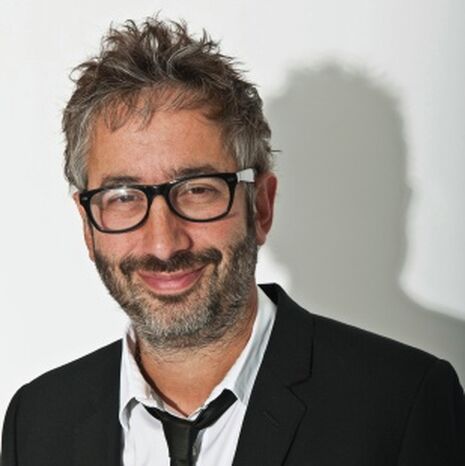Interview: David Baddiel
‘As a student I spent a lot of time wanting to be depressed…’ – Freya Berry talks to David Baddiel, officially the world’s sixth sexiest Jew

‘Laughter is a healing thing’, David Baddiel, comedian and writer, says to me over the phone. If so, Baddiel must have aided millions, whether in his early programmes for BBC or with his No. 1 single Three Lions, which he also sang live at Wembley to a hundred thousand people – becoming, along with Rob Newman, the first comedian ever to play and sell out the arena.
Baddiel is coming to Cambridge as part of Wordfest, the literary festival, where he’ll be publicizing his new book The Death of Eli Gold. ‘I’m more interested in real people than extraordinary people…those who are in the slipstream of greatness’, he says, citing the death of a minor henchman in Austin Powers where, for once, the camera cuts to showing the news of his death to his widow. It is an amusing scene yet also a dark reminder that even minor characters, within and outside of movies, have a back story of their own. Billed as a comedy by his publishers, it seems that his book also has a darker side than perhaps one might expect, taking as its subject a great dying writer who survived a suicide pact with his sister years before.
Baddiel was born in America but emigrated to England at the age of 4. He eventually graduated with a double first from King’s College, and was a member of the Footlights. It’s no surprise then that when he talks of Saul Bellow and Philip Roth when describing his (fourth) novel – influences we’d wince to hear other comedians using – it sort of works, rather than coming across as pretentious, though this may be because of his splendid facial hair. He’s obviously passionate about writing and describes his book to me at length.
He is a secular, atheist Jew – the sixth sexiest in the world, according to a 2006 survey. ‘Well, the fifth sexiest was Alan Sugar, so if we’re going to go by him…’ he tails off. ‘My kind of tone is quite Jewish, and I’m proud of that. The problem in this country, unlike in America, is that if you talk a lot about being Jewish you tend to get classified quite quickly.’
‘I had a really good time in Cambridge’, he says with enthusiasm, ‘Some of the book is based on my time at King’s actually, it was a kind of hotbed of political correctness, particularly about gender politics’.
Does he have any advice to budding comedians and writers? ‘Er…not really’, he laughs. ‘Now I’m older I’d be more worried about deciding I was going to be a comedian or whatever…but then I just went ahead and sort of did it – I’d advise people just to ignore the voices in their head’.
I ask him jokingly whether he is the stereotype of the secretly tragic comedian, only for him to reply that yes, he has actually been clinically depressed’. There’s an awkward moment, but he goes on to say, ‘I’m clear of all that now. I think there is a connection between depression and comedy, but a lot of people talk about being depressed – as a student I spent a lot of time wanting to be depressed, thinking I’d have some idea of what it was to be an artist’. Alas, depression turned out to be ‘really horrible, and much more like a physical illness than people realize’.
He recently wrote a film, The Infidel, based on a Muslim, played by Omid Djalili, wanting to become a Jew (hilarity, needless to say, ensues). Does religion need to be able to laugh at itself? ‘The film wasn’t interested in making fun of people’s faiths, though some people do that – it was to make fun of stereotypes. If it was a cartoon, it would have been about a dog wanting to become a cat…when you laugh, it’s really hard to hate people’. Judging by the reception of his ‘darkly witty’ books on Amazon, laughter makes it really hard for people to hate him too.
Cambridge Winter Wordfest takes place this year on Sunday 27th November. For more information visit www.cambridgewordfest.co.uk. To buy tickets go here, call 01223 300085, or visit the ADC Theatre in person (check Box Office opening hours).
 News / Pembroke to convert listed office building into accom9 December 2025
News / Pembroke to convert listed office building into accom9 December 2025 News / Gov declares £31m bus investment for Cambridge8 December 2025
News / Gov declares £31m bus investment for Cambridge8 December 2025 Features / Searching for community in queer Cambridge10 December 2025
Features / Searching for community in queer Cambridge10 December 2025 News / Uni redundancy consultation ‘falls short of legal duties’, unions say6 December 2025
News / Uni redundancy consultation ‘falls short of legal duties’, unions say6 December 2025 Lifestyle / Into the groove, out of the club9 December 2025
Lifestyle / Into the groove, out of the club9 December 2025









